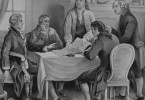Benjamin Franklin wrote a list of virtues with the idea of achieving moral perfection on habits useful to him. Soon he found out that the task was more difficult than he had imagined “Habit took the advantage of inattention”. He concluded that bad habits must be broken to prevent slipping and good ones acquired should be established. He intended to fix one habit at a time, attempting the whole at once would distract his attention.
This is his list of virtues and their meaning
- Temperance: Eat not to dullness. Drink not to elevation.
- Silence: Speak not but what may benefit others or yourself. Avoid trifling conversation.
- Order: Let all your things have their places. Let each part of your business have its time.
- Resolution: Resolve to perform what you ought. Perform without fail what you resolve.
- Frugality: Make no expense but to do good to others or yourself: i.e. waste nothing.
- Industry: Lose no time. Be always employed in something useful. Cut off all unnecessary actions.
- Sincerity: Use no hurtful deceit. Think innocently and justly; and, if you speak, speak accordingly.
- Justice: Wrong none, by doing injuries or omitting the benefits that are your duty.
- Moderation: Avoid extremes. Forbear resenting injuries so much as you think they deserve.
- Cleanliness: Tolerate no uncleanliness in body, clothes or habitation.
- Tranquility: Be not disturbed at trifles, or at accidents common or unavoidable.
- Chastity: Rarely use venery but for health or offspring; never to dullness, weakness, or the injury of your own or another’s peace or reputation.
- Humility: Imitate Jesus and Socrates.






